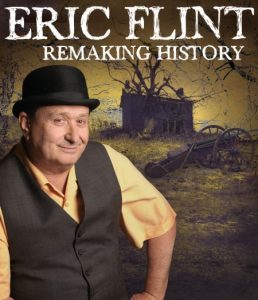Eric Flint: Remaking History

Eric Flint was born February 6, 1947 in Burbank CA. He spent five years in France, returning to the US at age ten and spending his teenage years near Fresno CA. He attended UCLA, graduating with a BA in 1968. He spent three years there pursuing a PhD in history, with a focus on southern Africa, before leaving academia to work as a political activist and labor organizer in the Socialist Workers Party. He supported himself as a truck driver and longshoreman until becoming a machinist’s apprentice in 1974. He spent most of his career as a machinist, though he also worked as a meatpacker, auto worker, and glassblower, among other things, and lived all over the country. He did some writing during those years, but became serious about it around 1992. In 1999, he left factory work and became a full-time writer.
Flint’s first publication of genre interest was ‘‘Entropy, and the Strangler’’ (1993). Debut novel Mother of Demons appeared in 1997, beginning a long association with Baen Books. His next publications were collaborations with David Drake, in the Belisarius series: An Oblique Approach (1998), In the Heart of Darkness (1998), Destiny’s Shield (1999), Fortune’s Stroke (2000), The Tide of Victory (2001), and The Dance of Time (2006).
Flint considered those first four collaborations his ‘‘apprenticeship’’ as a writer, and in 1999 wrote a proposal for 1632, intended to be a standalone about a small West Virginia town transported to 17th-century Germany. The novel was published in 2000 to great success, and became the start of a series written with various collaborators, and eventually a shared world with contributions from dozens of authors. Sequel 1633 was co-written with David Weber and appeared in 2002, followed by anthology Ring of Fire (2004). The series has continued with over 20 novels and several anthologies. Flint’s collaborators on the novels include Andrew Dennis, Virginia DeMarce, Walter H. Hunt, Charles E. Gannon, and more. 1636: The Ottoman Onslaught is out this January, and several more titles are forthcoming. Flint is publisher of The Grantville Gazette, a magazine of fiction set in the 1632 world, which began publishing sporadically in 2003 and became bi-monthly in 2007; it is currently edited by Walt Boyes. Since 2004 several Grantville Gazette anthologies have appeared, edited by Flint.
Other series include Rats, Bats and Vats, with Dave Freer, beginning with the eponymous title in 2000; the Joe’s World series, starting with The Philosophical Strangler (2001) and continuing with Forward the Mage (2002, with Richard Roach); the Pyramid series with Dave Freer, Pyramid Scheme (2001) and Pyramid Power (2007); the Heirs of Alexandria series with Mercedes Lackey & Dave Freer, starting with The Shadow of the Lion (2002); the Jao Empire series with K.D. Wentworth, beginning with The Course of Empire (2003); the Boundary series with Ryk E. Spoor, launched with Boundary (2006); several Honor Harrington novels with creator David Weber, beginning with Crown of Slaves (2003); alternate history duology 1812: The Rivers of War (2005) and 1824: The Arkansas War (2006). Standalone novels include The Tyrant (2002, with David Drake) and Slow Train to Arcturus (2008, with Dave Freer). Flint wrote The Wizard of Karres (2004) with Dave Freer & Mercedes Lackey, and The Sorceress of Karres (2010) with Freer, both sequels to James M. Schmitz’s The Witches of Karres (1949).
Some of Flint’s short work is collected in Worlds (2009), and The Aethers of Mars (2014) has a novella by Flint and a sequel by Charles E. Gannon. In addition to editing various 1632 anthologies, Flint also edited Jim Baen’s Universe for four years and edited The Best of Jim Baen’s Universe (2007) and The Best of Jim Baen’s Universe #2 (2008, with Mike Resnick). Other anthologies include The World Turned Upside Down (2008, with Jim Baen & David Drake), The Dragon Done It (2008, with Mike Resnick), and When Diplomacy Fails (2008, with Mike Resnick).
Flint lives in Indiana with his wife, Lucille; they have a daughter and two grandchildren.
Excerpts from the interview:
‘‘The characters in my 1632 series are a bit idealized. The people rise to the occasion – not unrealistically, but within the parameters of the way they behave, they do as well as they could. That’s the kind of story I wanted to tell. These modern people are transported back to an era that had Galileo, Pascal, and Descartes – they’re not the smartest people around by a long shot. They just have a different view of the world. I mostly wrote that book because I felt that Americans tend to take democracy and the principles of liberty, equality, fraternity for granted. I wanted to take a group of people raised that way, and put them into the worst war in European history, and see how it all unfolded. The irony is, it was intended to be a standalone novel. I had no intention of turning it into a series. Baen published the first one, 1632, in February of 2000. Because of the kind of book it is, I was trying to put together all kinds of facts I just didn’t have access to, so I kind of wrote the whole book in public. Baen has a very active website, so I told people there I needed help, and a whole bunch of people pitched in. I posted chapters as I wrote them, and people said, ‘Well, that wouldn’t work.’ For instance, in the first shooting scene in the farmhouse, I had the doctor do something medically that would really have been stupid, and I had the chief Navy corpsman in Hawaii saying, ‘No! You can’t do that.’ I got a lot of help from fans writing it. The town of Grantville is very closely modeled on the actual town of Mannington. There are rules that I require everyone to follow when they write in the series. One of them is that it if it wasn’t in the town of Mannington in 2000, you can’t have it in Grantville. The one cheat I had to do was that I needed a power plant. The power plant is about 15 miles away, in a town called Granttown, so I just sorta moved it over. That’s the only real cheat.”
…
‘‘I’ve been a full-time author since the end of 1999. I never had a job that lasted more than five years. I thought about it the other day. Of course, I’m 69, so I don’t know that anybody would want to hire me as a machinist. If I wanted to go back to work in a factory, I couldn’t put together a résumé because most of the places I’ve worked have gone out of business. It’s ironic for me, being a writer, but that’s partly because I stayed on topic. Jim Baen once said to me, ‘You know, I’m surprised. For a commie, you haven’t made any career mistakes.’ I said, ‘Jim, it’s because I’m never caught off-guard when capitalism lives down to my expectations.’ I’ll give him credit: he laughed. He thought that was funny. I’ve had a very successful career.
‘‘Andre Norton’s prose is pedestrian, and I hear her rough drafts were even worse, and she needed a lot of editing. Nevertheless, she had one of the most successful careers in the field, because she was a terrific storyteller. I like to think that I write better than that, but, like her, I’m first and foremost a storyteller. I can teach the craft of writing, but what I cannot do is tell someone how to make a good story. I have a good friend, a photographer, and he used to be a professional for years. It’s not his eyesight – he’s got terrible eyesight. It’s just that he can look at something, and I’ll see exactly the same thing he’s looking at, but he can see that if you framed it this way, it’d be a great picture. I can’t see the frame. That’s what a storyteller does, is frame a sequence of events in such a way that there’s a point to it, it makes sense, and you go somewhere with it. I don’t know how you teach that.”
…
‘‘I majored in history. I’m not surprised most people find it deadly dull, but if you get a good history teacher, you’ll get really engrossed in it. Quite a few history teachers, both high school and college, quietly have their students read my novels, because they say the history is pretty damn good. I have written some pure alternate histories: 1812: The Rivers of War and 1824: The Arkansas War, set in American history in the Jacksonian period. Some little change happens and the rest cascades from that. By the time you get to the early 19th century, the people are close enough to a modern consciousness that you can deal with it. It’s really hard to tell the stories I want to tell if you’re writing about people farther back. Without a modern viewpoint to mix into it, the characters can seem pretty repellent.”
…
‘‘I’ve got an advantage, too. I spent about 25 years of my life as a political organizer in the trade unions. It’s a skill set. I’m very good at getting people to work together. I’ve been told this for years – people enjoy working on this series. They don’t feel I’m squishing them or sitting on them. On the other hand, I do direct. There are times I’ll say, ‘No, we’re not going to go in that direction, and here’s why.’ But the other thing, too, is that whenever anyone comes up with an idea I haven’t thought of, I always try to incorporate it. That’s how history really works. Weird shit happens that nobody foresaw. That’s the way it goes. What happens with a long-running series is it tends to get predictable. Just because if you only have one or two authors, they’re going to get into a fixed mindset. I find this so far works, and we’re 16 years into it. This thing is now 21 times longer than Lord of the Rings. The 1632 series is probably a third of what I write. Alternate history is not more than half. There’s all this other stuff I do. I’ll get frustrated going into a bookstore, and they’ll have all this 1632 and 1633 books. Yeah, that’s fine, but I do a lot of other stuff.”
…
‘‘I tell people that the single stupidest comment about writing is the one that writers all love, which is Samuel Johnson’s ‘Only a blockhead would write for any other reason than money.’ All writers love that because it’s your armor against the wicked publishers. But the truth is that you have to be a complete blockhead to think that writing is a smart way to make a living. If it works, though – which it usually doesn’t – it’s a good way to make a living, because you don’t have a boss. I can honestly work anywhere there’s electricity, but if you’re looking for any kind of job that’s going to pay reliably, it’s hard. Authors in my position get a little grumpy sometimes. I don’t, because I don’t have the temperament for it, but I know some of them do, because they feel underappreciated. They typically sell very well but they rarely get nominated for awards. I don’t care myself, but some people do. Why care? Other jobs you don’t get awards either. You go to work and do the job.”
Read the complete interview in the December 2016 issue of Locus Magazine. Interview design by Francesca Myman.





